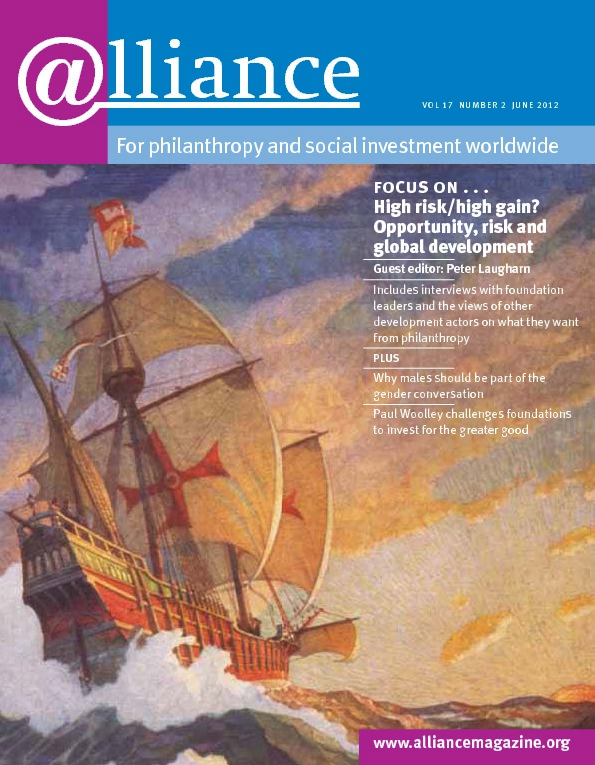Brian Currin is a veteran of peace processes in South Africa, Northern Ireland and the Basque country. Needless to say, much of the work is highly politically sensitive, with entrenched hatreds aggravated by acts of violence and retaliation. It’s the sort of terrain where foundations generally fear to tread. But the Joseph Rowntree Charitable Trust (JRCT) has been a staunch supporter of Currin’s efforts, as he explains to Alliance. From the JRCT side, Stephen Pittam reflects on the risks and rewards of this sort of funding.
Interview with Brian Currin
What has been your involvement in the Basque peace process?
I became involved around the end of 2004, through the Basque pro-independence left party Batasuna, who launched what became known as the Anoeta peace process, which collapsed at the end of 2006. This convinced me that there could not be a successful peace process as long as Batasuna, the party that represented those who felt they were denied legitimate means to promote their right to self-determination, was banned and could not participate. So I worked with Batasuna to explore the option of rejecting violence, which was a necessary preliminary for their legalization, and which would eventually involve their rejection of ETA, if ETA were to commit acts of violence.
I also persuaded five Nobel Peace Laureates, including Desmond Tutu and Mary Robinson, peace activist groups, the Nelson Mandela Foundation and individuals to sign what became known as the Brussels Declaration. This brought influential international opinion to bear and enabled ETA to declare a ceasefire with confidence in January 2011. This was ratified in October 2011 at the San Sebastian peace conference – attended by Kofi Annan, Bertie Ahern, Gerry Adams and the Prime Minister of Norway – with ETA’s unilateral statement that the war was over. (Pictured above: Brian Currin with Gerry Adams at the peace conference in San Sebastian in October 2011, which resulted in ETA declaring an end to their armed struggle.)
An international contact group and ceasefire verification commission have now been established. So far, however, the French and Spanish governments have not done what they committed to do and negotiations are continuing.
Were you working on your own until the Brussels Declaration?
Yes, except for the year after the collapse of the Anoeta peace process when I formed the International Group for Peace and Dialogue in the Basque Country to keep dialogue going between the parties. Then I came to the conclusion that the focus needed to shift to Batasuna and ETA and I worked on my own, with logistical support from a local NGO, Lokarri, until we established the international contact group in January 2011.
How did you first come across JRCT?
They were aware of my human rights work in South Africa, but the first direct engagement with them came through the mediation I did in Drumcree in 2000-02, as Stephen describes (see below). They funded my work in the Basque country from around 2006 right through until 2011, funding me direct, as an individual. The last money I had from them was spent on preparing for the San Sebastian conference – which was actually supported by other funders.
What were the conditions of their grants?
Every single grant was based on a proposal with set objectives, mostly for about a year – for instance, that in a year’s time I would have a statement from Batasuna that they were willing to renounce violence. With only one exception, the objectives were met. At that point, we would set new ones. So you could see progress being made. The one thing that was delayed was support from the international community, but JRCT understood the dynamics and were willing to go on for another year, which basically took us to the Brussels Declaration and then to the conference.
Would you have been able to do this work without support from them?
It would have been absolutely impossible. I never gave up trying to get other funders because I felt guilty about getting money always from JRCT and I didn’t want to put Stephen in the difficult position of having to constantly battle for me.
If you were meeting annual objectives, they were getting pretty good value for their funding. In that sense it wasn’t so risky.
But it was politically risky. And if nobody will go in with you, it is never comfortable. Stephen and I both received ‘hate’ mail from people who objected to work being done with ‘terrorists’. And we both received similar treatment from the right-wing media in Spain. The other big risk, as some of the JRCT trustees pointed out, was that they couldn’t trust ETA and at some stage they would let us down. That was my job – to make sure this didn’t happen.
For more information
http://www.basquepeaceprocess.info
The funder’s view – Stephen Pittam
Most discussions I have about foundations eventually end up with the basic question: what are foundations for? There is no one answer to this question, and we all have to work from where we are. It is important, though, that we occasionally ask a basic question: what is it that independent endowed foundations can do that no other funding agency can?
I have borrowed the title for this article from a report that the Community Foundation for Northern Ireland (CFNI) published on its long-standing and impressive work on peace-building. It’s appropriate in more ways than one, for the story of JRCT’s role in supporting Brian Currin’s work in the Basque country starts in Northern Ireland.
I was first introduced to Brian Currin by a senior civil servant in the Northern Ireland Office (NIO). At the time the peace process was in danger of being derailed by the dispute over the Drumcree parade in Portadown. The NIO had asked Brian if he would consider acting as mediator. Brian had assessed the situation and returned to the NIO with the message that he would take on the task, but only if it was independently funded – in his view the British government was a party to the conflict and he would be compromised if he accepted government funding. Thus began a two-year mediation process funded by JRCT and Atlantic Philanthropies. Only foundations could have supported this work. It didn’t solve the problem, but it took the heat out of the situation, and the peace process moved on.
What do you do following a conflict when it is imperative that the political representatives of the paramilitary organizations join the board of the police force (albeit reformed) they have been fighting? Imagine the tensions involved. Once again Brian Currin agreed to tackle this dilemma and to become a leading member of InterAction Belfast’s team, which brought some of the key players together to work through the pain and heartache on all sides and to build the courage to envisage a different future. This initiative was one contribution to the process that has led to the new police board becoming fully operational. It is another example of work that, in its early stages, could have been funded only by an independent foundation. JRCT was privileged to support this work.
And how do you respond when the political representatives of a movement with a paramilitary wing in a different European country approach the person you have come to admire and trust and ask him if he can help build a peace process in another long-standing conflict? Do you say that this falls outside your remit (which it does)? Do you say that you do not understand the conflict (which we didn’t)? Do you say that a foundation should never risk an association with a process that might engage indirectly with ‘banned organizations’? Or do you decide that the cause of peace is of such importance that it is worth taking the risk to strengthen the hand of a remarkable person to test what is possible? Is this work that only a foundation could support?
No one should underestimate the difficulty of taking such decisions. They require deep thought and consideration. A judgement has to be reached on the basis of good-quality information and testing this through meetings with the applicant. There is a duty to keep well informed. One has to accept the possibility that, if things go wrong, the foundation will be accused of being naive and rash. I am proud, though, that after careful thought and deep consideration, the Trustees of JRCT decided to take the risk and back Brian Currin. I hope I would have the courage to say this even if the initiative had failed. And at many times over the last five years this looked possible, and hope was in short supply. The breakthrough eventually came in January 2011 when ETA declared a permanent, unilateral ceasefire to be verified by the international community. Nine months later ETA declared an end to their armed activity, effectively ending their armed struggle. This is not the end of the conflict in the Basque country by any means, but the context has changed and it just may be the beginning of the end.
Martin Luther King once said that ‘the ultimate measure of a man is not where he stands in moments of comfort, but where he stands at times of challenge and controversy’. The same sentiment can be applied to the foundation world. Where do we stand at times of challenge and controversy? Do we take the safe road and refuse to engage with the contentious issues of the day? Or do we recognize the unique space that we occupy that gives us greater freedom to engage with the challenging issues that our societies face, and take the risks to create a more peaceful and socially just world?
Stephen Pittam is secretary of JRCT. Email stephen.pittam@jrct.org.uk






Comments (0)